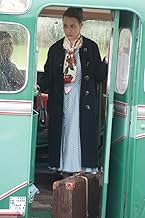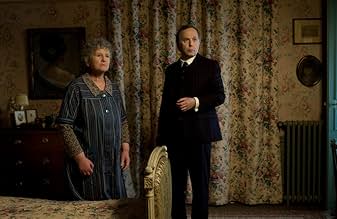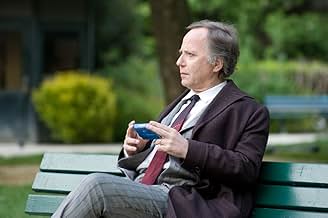IMDb-BEWERTUNG
7,1/10
10.791
IHRE BEWERTUNG
Im Paris der 1960er-Jahre wird das Leben eines konservativen Ehepaars von zwei spanischen Dienstmädchen kräftig durcheinander gewirbelt.Im Paris der 1960er-Jahre wird das Leben eines konservativen Ehepaars von zwei spanischen Dienstmädchen kräftig durcheinander gewirbelt.Im Paris der 1960er-Jahre wird das Leben eines konservativen Ehepaars von zwei spanischen Dienstmädchen kräftig durcheinander gewirbelt.
- Auszeichnungen
- 2 Gewinne & 3 Nominierungen insgesamt
Handlung
WUSSTEST DU SCHON:
- WissenswertesPhilippe Le Guay took inspiration from his own childhood. His father was a stockbroker like Jean-Louis Joubert in the film and he himself had a Spanish maid.
- PatzerIn the street, most (if not all) men wear hats, caps or Basque berets. In France, most men stopped wearing headgear in the 1950s (in cities at least). By 1960, the vast majority of men were hatless.
- VerbindungenFeatured in Ebert Presents: At the Movies: Folge #2.13 (2011)
- SoundtracksItsi Bitsi, Petit Bikini
(Itsy Bitsy Teenie Weenie Yellow Polkadot Bikini)
Music by Lee Pockriss
English lyrics by Paul Vance
French lyrics by Lucien Morisse and André Salvet
Performed by Dalida
© Emily Music Corporation and Music Sales Corporation
Avec l'aimable autorisation de Campbell Connelly France
(P) 1960 Barclay
Avec l'autorisation de Universal Muis Vision
Ausgewählte Rezension
A great review by Robert Beames (coulden't have done it better myself!!) It has been given the more toner-friendly English language title of Service Entrance, but comic French drama Les Femmes Du 6eme Etage translates literally as The Women on the 6th Floor. Shown out of competition in Berlin, the film was very warmly received thanks in part to the performances of its sweet and amiable leading man, Fabrice Luchini, and its beautiful Spanish leading lady played by Natalia Verbeke. These actors combine with the film's leisurely pacing and entertaining scenario to ensure that it is a winsome and inoffensive crowd-pleaser.
The film, set in the 1960s, follows a wealthy, middle-aged Parisian stockbroker named Jean-Louis (Luchini) whose long-standing maid quits following a row with his demanding wife Suzanne (Sandrine Kiberlain). Unable to clean up after themselves, the couple desperately need a new maid. But when Suzanne's high society friends insist French maids aren't the done thing anymore, she enlists the help of Maria (Natalia Verbeke), a feisty, young Spanish immigrant. Jean-Louis forms an instant and obsessive attraction to her and to all things Spanish, soon striking up unlikely friendships with all the Spanish ladies who live in the servant's quarters above his home – a place he knows nothing about despite living in the building his entire life. Worlds collide and good-natured japes ensue as he helps each lady adjust to life in France whilst himself inheriting a new found love of life.
I don't think it's necessarily a coincidence that both the more shamelessly enjoyable films I've seen here up to now have been broad comedies about cultural difference and histories of mass immigration – with Almanya looking at German-Turks and Service Entrance exploring the relationship, and the comedy that comes of misunderstanding, between the French and their Spanish workforce. Immigration is still a political hot potato issue in these countries, as it remains in much of Europe, and maybe light-hearted comedy is seen as the best way to preach tolerance, reaching a bigger audience than earnest polemic. In mocking bigotry and by setting it in the past (as an old fashioned attitude) perhaps it is felt that people might be less inclined to identify with those views.
In any case both films are funny and have their hearts firmly in the right place. This French offering is gentler and less ballsy than it's Turkish-German counterpart, but no less enjoyable. The character of Jean-Louis is incredibly easy to like, being child-like in his enthusiasm for his new-found interest in Spain. The character of Suzanne is also refreshingly balanced and nuanced. She'd usually be a two-dimensional figure we would be encouraged to dislike in order to make it permissible for Jean-Louis to consider romance with Maria and yet the film doesn't go down that route: she can be annoying and insensitive but she isn't a nasty person. Maria and the other Spanish ladies are also a joy to watch as they interact with one another and fuss over cheerful little Jean-Louis.
Service Entrance is the filmic equivalent of a soufflé and certainly not a tough watch typical of the standard festival fare. Indeed it falls into the dubious realm of the "feel good" movie. But sandwiched, as it is here, between two-hour long Shakespeare adaptations, Bela Tarr movies, Argentinian slow cinema and films about nuclear disasters, it is exactly the kind of film you need to see in order to keep sane. It is difficult to say whether wider criticism in France will be anything like as positive when removed from this context on theatrical release, but here it offered exactly what was needed and nobody appreciated that more than I.
The film, set in the 1960s, follows a wealthy, middle-aged Parisian stockbroker named Jean-Louis (Luchini) whose long-standing maid quits following a row with his demanding wife Suzanne (Sandrine Kiberlain). Unable to clean up after themselves, the couple desperately need a new maid. But when Suzanne's high society friends insist French maids aren't the done thing anymore, she enlists the help of Maria (Natalia Verbeke), a feisty, young Spanish immigrant. Jean-Louis forms an instant and obsessive attraction to her and to all things Spanish, soon striking up unlikely friendships with all the Spanish ladies who live in the servant's quarters above his home – a place he knows nothing about despite living in the building his entire life. Worlds collide and good-natured japes ensue as he helps each lady adjust to life in France whilst himself inheriting a new found love of life.
I don't think it's necessarily a coincidence that both the more shamelessly enjoyable films I've seen here up to now have been broad comedies about cultural difference and histories of mass immigration – with Almanya looking at German-Turks and Service Entrance exploring the relationship, and the comedy that comes of misunderstanding, between the French and their Spanish workforce. Immigration is still a political hot potato issue in these countries, as it remains in much of Europe, and maybe light-hearted comedy is seen as the best way to preach tolerance, reaching a bigger audience than earnest polemic. In mocking bigotry and by setting it in the past (as an old fashioned attitude) perhaps it is felt that people might be less inclined to identify with those views.
In any case both films are funny and have their hearts firmly in the right place. This French offering is gentler and less ballsy than it's Turkish-German counterpart, but no less enjoyable. The character of Jean-Louis is incredibly easy to like, being child-like in his enthusiasm for his new-found interest in Spain. The character of Suzanne is also refreshingly balanced and nuanced. She'd usually be a two-dimensional figure we would be encouraged to dislike in order to make it permissible for Jean-Louis to consider romance with Maria and yet the film doesn't go down that route: she can be annoying and insensitive but she isn't a nasty person. Maria and the other Spanish ladies are also a joy to watch as they interact with one another and fuss over cheerful little Jean-Louis.
Service Entrance is the filmic equivalent of a soufflé and certainly not a tough watch typical of the standard festival fare. Indeed it falls into the dubious realm of the "feel good" movie. But sandwiched, as it is here, between two-hour long Shakespeare adaptations, Bela Tarr movies, Argentinian slow cinema and films about nuclear disasters, it is exactly the kind of film you need to see in order to keep sane. It is difficult to say whether wider criticism in France will be anything like as positive when removed from this context on theatrical release, but here it offered exactly what was needed and nobody appreciated that more than I.
- ingelaallard
- 18. März 2011
- Permalink
Top-Auswahl
Melde dich zum Bewerten an und greife auf die Watchlist für personalisierte Empfehlungen zu.
- How long is The Women on the 6th Floor?Powered by Alexa
Details
- Erscheinungsdatum
- Herkunftsland
- Offizielle Standorte
- Sprachen
- Auch bekannt als
- The Women on the 6th Floor
- Drehorte
- Produktionsfirmen
- Weitere beteiligte Unternehmen bei IMDbPro anzeigen
Box Office
- Budget
- 7.000.000 € (geschätzt)
- Bruttoertrag in den USA und Kanada
- 719.823 $
- Eröffnungswochenende in den USA und in Kanada
- 26.200 $
- 9. Okt. 2011
- Weltweiter Bruttoertrag
- 27.533.970 $
- Laufzeit1 Stunde 42 Minuten
- Farbe
- Sound-Mix
- Seitenverhältnis
- 1.85 : 1
Zu dieser Seite beitragen
Bearbeitung vorschlagen oder fehlenden Inhalt hinzufügen

Oberste Lücke
By what name was Nur für Personal! (2010) officially released in India in English?
Antwort
![Bande-annonce [OV] ansehen](https://m.media-amazon.com/images/M/MV5BNTdmOTBjM2UtOTUyMS00NDViLWI4NWEtNmVhODc1NDVjN2NlXkEyXkFqcGdeQXRyYW5zY29kZS13b3JrZmxvdw@@._V1_QL75_UX500_CR0)
















